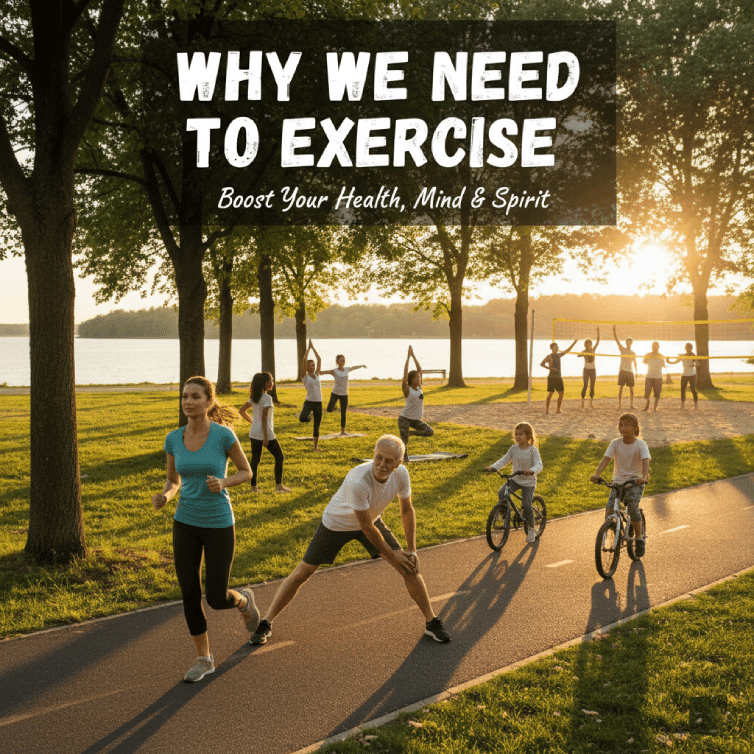Have you ever wondered when you go for a walk, it feels like something is more to it than just having some fresh air and a bit of exercise? Richard Uzelac always thought so. My mood shifts, my mind clears up, and I start to feel calmer. It’s wild how a simple walk can completely change the tone of your day.
That’s when it hit me—there’s real truth to the idea that moving your body makes you feel better. It’s not just all about fitness or burning calories; it’s about how exercise can reset your mind and lift your mood. And so here’s why Richard Uzelac presents the reasons why we need to exercise.
Mental Health Benefits: Alleviating Depression and Anxiety
Exercise is a powerful tool that helps regulate depression and anxiety. When you work out, your body releases mood-boosting chemicals.
Regular physical activity profoundly changes your brain chemistry over time, increasing levels of serotonin and dopamine. Studies consistently show that people who exercise report significantly fewer days of poor mental health. For those dealing with anxiety, higher levels of physical activity can also offer protection against worsening symptoms. That said, exercise is most effective when used alongside professional treatment, not as a replacement for it.
Physical and Cognitive Enhancement
Exercise doesn’t just make you feel good in the moment—it genuinely helps your brain work better. Regular movement improves sleep quality by increasing the amount of deep sleep and regulating cortisol, the stress hormone that disrupts rest. Moreover, exercise promotes the growth of new brain cells through a protein called BDNF (brain-derived neurotrophic factor). This enhances brain plasticity, which is vital for learning and memory. You might notice you think more clearly and remember things better when you are consistently active. For motivation, consider this: research from Johns Hopkins Medicine shows that just 30 minutes of moderate aerobic activity can improve your sleep quality that very night.
Emotional and Social Wellness
Beyond the physical effects, exercise is a genuine confidence booster that combats social isolation. There’s an undeniable sense of accomplishment in meeting any fitness goal, even just a 10-minute walk. Furthermore, working out with others adds a significant layer of benefit. Group activities like hiking or joining a sports league forge social connections. Research shows that having workout buddies can dramatically improve overall happiness. Finally, physical activity is a healthy way to release built-up tension and stress. If you tend to hold stress in your body, movement provides a healthy outlet to unwind.
Combating Sedentary Lifestyle Risks
Sitting all day is genuinely bad for you—one in four Americans sits for more than eight hours daily. Sedentary lifestyles aren’t just linked to physical problems like chronic illness; they’re also connected to anxiety, depression, and other mental health concerns. The World Health Organization has raised serious alarms about this. When you’re stuck at your desk all day, your body and mind both suffer. Getting up and moving, even briefly, counters these risks. You don’t need to run marathons—simple activities like taking the stairs, gardening, or even vacuuming count toward movement. The key is breaking up those long periods of sitting with any kind of physical activity throughout your day.
Finding Your Feel-Good Activities
Not everyone loves the same type of exercise, and that’s perfectly fine. Some people feel energized by kickboxing, while others find peace in yoga. The key is finding what makes you feel good. Research shows that self-chosen exercise leads to the greatest mood benefits and is what you are most likely to stick with long-term. So forget what you “should” do and focus on what you actually enjoy. That’s what you’ll stick with long-term.
Overcoming Barriers to Movement
Let’s be real—when you’re feeling depressed or anxious, exercising is probably the last thing you want to do. That’s completely normal and understandable. The trick is making it as easy as possible to start. This is not a one-size-fits-all solution. Look at what’s best for yourself to start the momentum. Do you love music? Then put on those headphones. Do you like a good view? Then do exercise outside. Also, don’t feel terrible about not being able to keep up. Don’t be too hard on yourself, a Richard Uzelac’s Motto. Start small and build from there.
Conclusion
Richard Uzelac couldn’t stress enough how important exercise is..
Exercise is a valuable piece of a larger wellness puzzle. Physical activity genuinely affects how we feel mentally and emotionally. When you move your body, you’re not just burning calories or building muscle. You’re actually triggering chemical changes in your brain that influence your mood. Scientists have found that exercise increases neurotransmitters like serotonin and dopamine. Among many physical benefits, it also works like a magic potion.

